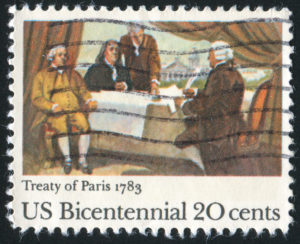The inscription in this story is recorded at the Mullins-Stacey cemetery in North Carolina, where several early Mullins relatives are buried . . .
“Thomas Mullins (1740-1817) seized this farmland 900 acres in 1785.”
This inscription documents Reverend Thomas Mullins‘ seizure of an enormous tract of Piedmont farmland from a Loyalist family. The Reverend’s land acquisition elevated the Mullins family into the ranks of the wealthiest local families, where they would remain for generations. However, the seizure was in direct violation of the 1783 Treaty of Paris that ended the American Revolution.

What Was The Treaty Of Paris?
During the Revolutionary War, patriots often commandeered property and possessions that belonged to colonists who remained loyal to the British Crown, as well as threatening them with harassment and physical violence. One of the goals of the treaty that ended the Revolutionary War, the Treaty of Paris, was to promote reconciliation in the new United States. Of its 10 articles, two specifically addressed the confiscation of property:
- The fifth article stated that Congress would “earnestly recommend” that state legislatures recognize the rightful owners of all confiscated lands.
- The sixth article stated that the United States would prevent future confiscation of Loyalist property.
Mullins Family Defiance
However, the people of several southern states, including the Mullins family, were defiant. In 1785, the same year that Rev. Mullins seized his new land, the North Carolina legislature passed a statute forbidding state courts from hearing suits from Loyalists trying to recover their land. The state courts spent years wrestling with the conflict between the 1785 statute, the North Carolina constitution (which guaranteed citizens access to the courts), and the Treaty of Paris. In negotiating the spaces between these laws, state courts took the first small steps toward establishing a judicial review of legislation. Despite this, Loyalists uniformly lost the effort to win back their lands in the end.
Camp Family Neutrality
There are also Mullins ancestors on the other side of this conflict. The Reverend Joseph Camp of South Carolina was an Anabaptist minister and physician who preached neutrality from the pulpit during the war. Just before the Battle of Kings Mountain, General Cornwallis took Rev. Camp as a prisoner on suspicion of spying for the Colonial Army. He was released after a few hours and had no other direct involvement in the war.
However, two of Rev. Camp’s brothers fought with the British at the Battle of Kings Mountain—both suffered confiscation of all their land and possessions as a result. For years, the Camps fought unsuccessfully in state courts to regain their land. Eventually, most of the Camps left South Carolina for Indiana to start new lives.
© 2013 W. Mullins
